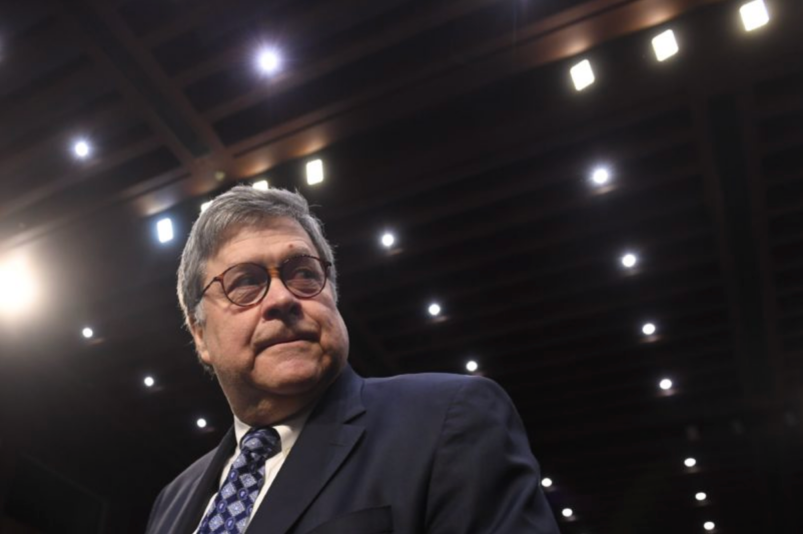Attorney General Bill Barr is ready to investigate.
FBI “spying,” the Steele dossier, you name it, we now know from his Wednesday hearing before the Senate Judiciary Committee.
Former federal prosecutors told TPM that Barr’s statements that he would personally examine the origins of the Russia probe were unprecedented, and risked creating the impression that he is not an independent law enforcement officer but a purely political figure.
If he carries out his promise to personally conduct the investigation, attorneys said, Barr would go beyond building a narrative to counter Mueller’s findings and fully break with Justice Department tradition of keeping sensitive investigations of alleged government wrongdoing insulated from political interference.
“There is an appropriate place for [this investigation],” said former former federal prosecutor Ryan Fayhee. “It’s a referral to the Inspector General’s office, and the reason we know that’s the right place is because they’re the ones that always do this.”
Barr said during his bellicose Wednesday Senate testimony that he had “people in the department helping me” review the FBI’s activities regarding the Trump campaign in summer 2016.
“These are the things that I need to look at,” Barr told Sen. Mike Lee (R-UT) in response to a question about whether the government had gotten a FISA warrant on any Trump campaign official apart from Carter Page. “To the extent there was any overreach, I believe it was a few people in the upper echelons of the [FBI] and perhaps the Department [of Justice] but those people are no longer there.”
It’s not clear what form Barr’s investigation will take.
He said that he envisioned “some kind of reporting” at the end of the process, meant to look into right wing media-driven allegations that the FBI “spied” on the Trump campaign.
An attorney general personally running an investigation is uncharted territory, former prosecutors told TPM.
Historically, attorneys general have set law enforcement priorities, acting as the country’s chief lawyer while navigating the political realities that prompted their nomination.
That, attorneys said, requires a measure of caution.
“The attorney general is halfway between being the chief law enforcement officer and being a political figure,” said Bruce Green, a law professor at Fordham and former prosecutor on the Iran-Contra investigation. “Conventionally, we want prosecutorial decisions to be made in a politically neutral, non-partisan way, and he is not in the best position, and perhaps in the worst position, to do that.”
Others said that Barr is courting accusations that he’s simply doing President Trump’s bidding.
“It is highly unusual if not unprecedented,” Fayhee told TPM. “The statements around opening an investigation, using this term ‘spying,’ on the presidential campaign is a statement that is designed for an audience of one.”
During Wednesday’s hearing, Barr also repeatedly expressed “concerns” about certain events leading to the start of the Trump-Russia probe in summer 2016.
At one point, Sen. John Cornyn (R-TX) asked whether the so-called Steele dossier laying out an alleged web of ties between Russia and the Trump campaign actually constituted part of Russia’s interference campaign.
“That is one of the areas that I am reviewing,” Barr replied.
“I’m concerned about it,” he added. “And I don’t think it’s entirely speculative.”
Barr’s comments surprised some.
“They don’t go looking to prove that someone is guilty, they’re trying to determine whether or not there is a violation, so you have to be concerned about something,” David S. Weinstein, a former federal prosecutor, said of his former colleagues at the Justice Department. “But I don’t disagree that it does sort of telegraph what he perceives going in.”
“If, in reviewing the Mueller report, he came across something that was concerning, you’d expect that he’d kick it to a prosecutor,” Green said. “You certainly wouldn’t expect him to make a judgment on incomplete information.”
In terms of how Barr’s “examination” could play out within the Justice Department, the attorney general has a few options, should he distance himself from the probe.
He could refer the case to the Inspector General, the traditional route to respond to such complaints. Inspector General Michael Horowitz is, in fact, already investigating whether FBI officials abused the FISA process in obtaining the warrant to surveil Page.
Alternatively, Barr could appoint a special designated prosecutor within the Justice Department to probe the allegations.
But Barr’s comments about making this his personal mission have provoked shock and consternation on Capitol Hill.
Rep. Jamie Raskin (D-MD) told TPM that Barr had “disgraced himself and the legal profession” by “giving aid and comfort to the most paranoid conspiracy theories on the extreme right.”
“No president, Democrat or Republican before, ever asserted the right to use the law enforcement function as a personal political tool like that,” he said. “The idea that the attorney general should collaborate rather than refute that conception is really scary.”
Tierney Sneed contributed to this report.






